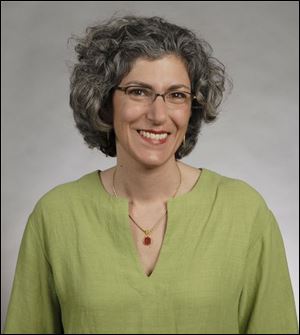
Growing up an atheist: Author works out feelings
7/14/2007
Nica Lalli
Atheism is a hot topic right now, with bestselling books on the subject written by such prominent authors as Christopher Hitchens, Richard Dawkins, and Sam Harris.
But for Nica Lalli, growing up in an atheist family in America's heartland was nothing trendy, but rather a struggle that caused feelings of alienation and tears of embarrassment.
It has taken Ms. Lalli a lifetime to accept her lack of faith and to feel confident in her nonbelief, a journey that she recounts in her first book, Nothing: Something To Believe In (Prometheus, $17).
Unlike the writings of Mr. Hitchens, Mr. Dawkins, and Mr. Harris, which critics have described as "atheist manifestos," Ms. Lalli's book is a memoir that reflects an arduous coming to terms with atheism and gaining a sense of comfort despite living in a country where 90 percent of the people profess a belief in God.
In a recent interview, Ms. Lalli, a painter and an art educator at the Metropolitan Museum of Art in New York City, said she felt compelled to write about her views on religion, or lack thereof, because the topic was unavoidable in her daily life and because writing helped her sort through her own swirling thoughts and feelings.
"I'm a journal writer. I've kept a journal for my entire life since I was in fifth grade," she said. "I started writing about my memories of religion and why is this such a hot-button topic for me, someone who doesn't have a religion? Why don't I just say, 'Shut up, keep away'? What is the pull here?"
Looking back, she said, her life seemed to be "transsected" by memories of religion. Her journal entries detailing those moments began to take shape as book chapters, she said.
In the second chapter of Nothing, for example, Ms. Lalli vividly describes a conversation she had as a first- grader when she called for a meeting with her parents in their Chicago home.
"So, what are we?" she remembers anxiously asking her mother and father. "You know, what are we, what do we believe in? I mean, like, are we Catholic?"
"Well, your father was Catholic. But he isn't anymore," her mother explained.
Her mother, meanwhile, said she was Jewish, but did not practice Judaism.
Ms. Lalli got the inspiration for her book's title from her father's follow-up answer:
"'We're nothing.' My father was looking right at me; he had a pleasant, friendly kind of expression. 'Nothing,' he said again."
One of the more recent thorns in her atheistic side comes from her born-again Christian in-laws. They cannot accept her atheism, and their concerns for Ms. Lalli's eternal soul have led to many painful, heart-wrenching conflicts and clashes.
"I am trying to work through why we're such a huge threat to believers," Ms. Lalli said. "The only thing I can come up with is that our nonbelief makes their belief shaky somehow."
The process of putting her memories down on paper was therapeutic, she said. At first, she just wanted to write about them without any plans for publication.
After five months of writing, getting up at 5 a.m. before her husband and two young children were awake, she completed a rough draft.
"It came out so easily. I couldn't believe it," she said. "I wrote it, rewrote it, wrote a treatment for it, and then said, 'Oh, OK, so what do I do now?'"
Friends in the publishing business helped her write and mail query letters, but Ms. Lalli said her goal was "just trying to follow this to its logical conclusion. It was OK whether it became a manuscript that just sat on my shelf, or a family thing that I passed on to my friends and children."
She said she has been pleasantly surprised by reactions from some readers.
"People who are like-minded have reacted very well to it, which is not much of a surprise. But what is a huge surprise is that people who are believers love this book," she said. "A couple of people have told me that's an important book for people of faith to read because it's really just all about understanding each other in the end. If believers can understand nonbelievers, maybe we'll have more productive dialogue.
"Sitting around saying, 'You're wrong;' 'No, you're wrong,' isn't going to get us anywhere. I wanted to try to add to a productive dialogue and when they have interfaith discussions, I would hope that they start to include people who don't believe. As a group, atheists are still very unpopular."